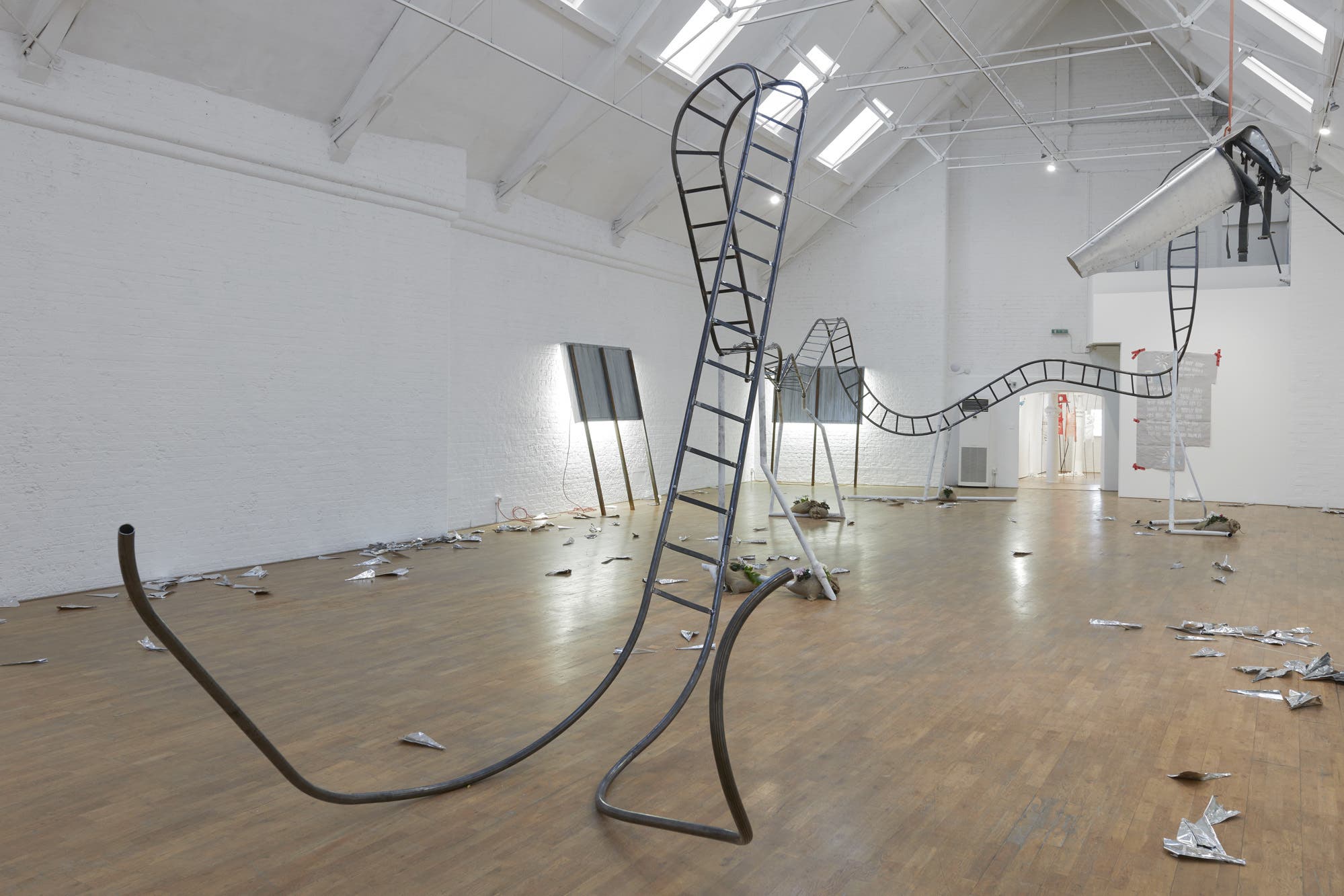Turner prize winner Jesse Darling waves Palestinian flag during speech
Darling, 41, was handed the £25,000 prize for work comprised of faded union jack bunting and metal pedestrian barriers
When Turner Prize winner Jesse Darling gave his acceptance speech on Wednesday (5 December), the artist pulled a Palestinian flag from his pocket.
When asked later why, the artist said: “Because there’s a genocide going on and I wanted to say something about it on the BBC.”
Darling, an Oxford-born artist, 41, was presented the award by rapper Tinie Tempah on Wednesday and was handed the £25,000 prize for work comprised of faded union jack bunting and metal pedestrian barriers.
Darling’s winning installation Towner Eastbourne is made up of faded union jack bunting and metal pedestrian barriers.
The artist, who works primarily in sculpture, was commended by the jury for his “use of materials and commonplace objects like concrete, welded barriers, hazard tape, office files and net curtains, to convey a familiar yet delirious world invoking societal breakdown, his presentation unsettles perceived notions of labour, class, Britishness and power.”
For his winner’s speech, Darling criticised former British prime minister Margaret Thatcher for taking art out of schools because it wasn’t “economically viable”.
He said: “She paved the way for the greatest trick the Tories ever played, which is to convince working people in Britain that studying, self-expression and what the broadsheet supplements describe as ‘culture’ is only for certain people in Britain from certain socio-economic backgrounds. I just want to say don’t buy in, it’s for everyone.”

Born in 1981, Darling studied at Central Saint Martins at the University of the Arts London and completed a Masters in fine art at University College London’s Slade School of Fine Art in 2014.
He works across sculpture, installation, video, drawing, sound, text and performance – and in 2021 released a collection of poetry, called Virgins. The Turner Prize jury, which includes Melanie Keen, director of the Wellcome Collection, praised the artist’s ability to manipulate materials “in ways that skilfully express the messy reality of life” and expose “the world’s underlying fragility”.
Alongside Keen, the Turner Prize 2023 jury are: Martin Clark, director of Camden Art Centre; Cédric Fauq, chief curator at the Capc musée d’art contemporain de Bordeaux; and Helen Nisbet, chief executive and artist director of Cromwell Place. The jury is chaired by Alex Farquharson, the director of Tate Britain.

The Oxford-born artist’s nomination was based on the merits of two exhibitions, No Medals No Ribbons, and Enclosures.
No Medals, No Ribbons, held at Modern Art Oxford, is an installation featuring steel roller coaster tracks bent into the skeleton form of a woolly mammoth. Darling said the installation was intended to “question dominant narratives about the world”.
Meanwhile, Enclosures, another of Darling’s installations held at Camden Art Centre, was said by Darling to be focused on the “unspeakable violence in the privatisation of literally everything in the UK”.
Darling has also put together solo exhibitions such as Miserere in St James’s Piccadilly, London in 2022, Gravity Road at Kunsteverein Freiburg in Germany in 2020, Creve at Triangle – Asterides in Marseille in 2019 and The Ballad of Saint Jerome in Tate Britain London in 2018.
The Turner Prize, which will celebrate its 40th anniversary in 2024, aims to promote public debate around new developments in contemporary British art and is awarded to an artist born and raised in the UK for an outstanding exhibition or presentation of their work over a 12-month period.
An exhibition of the Turner Prize shortlisted artists is at Towner Eastbourne until April 14 2024.
Join our commenting forum
Join thought-provoking conversations, follow other Independent readers and see their replies
Comments
Bookmark popover
Removed from bookmarks